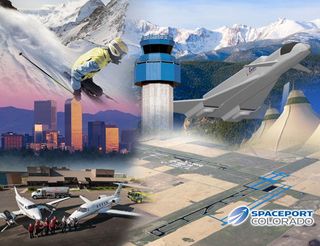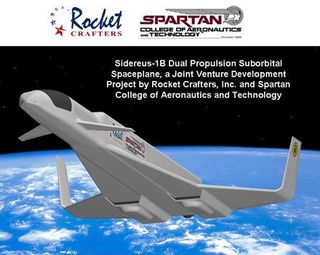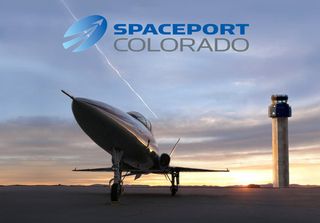
Proposed Colorado Spaceport Could Be Suborbital Spaceflight Hub

The proposed Spaceport Colorado is moving closer to reality, with its supporters seeing it as an ideal hub to support high-speed suborbital flights with intercontinental range.
Front Range Airport, striving to be the home of Spaceport Colorado, signed a letter of intent last month with Rocket Crafters Inc. for horizontal launch, dual-propulsion, suborbital flight operations at the general aviation airport.
Founded in late 2010, Rocket Crafters Inc. of Titusville, Fla., is focused on development, manufacturing and distribution of rocket propulsion and dual-propulsion (jet/rocket) suborbital flight vehicle products to the commercial markets in the space, space exploration and defense industries.
In a statement from the Metro Denver Economic Development Corporation (Metro Denver EDC), the letter of intent outlines a mutual plan to promote and develop Spaceport Colorado at Front Range Airport as the preferred commercial spaceport in America’s heartland. [Now Boarding: Top10 Private Spaceships]
Front Range Airport has 996 acres of developable land adjacent to existing ramps or is master planned to be accessible to ramps and taxiways. A 6,300-acre business park is also planned for development to support airport-related commercial activities and businesses with direct access to highway, rail, and airport services.
Front Range Airport is 6 miles (9.6 kilometers) from Denver International Airport, in Watkins, Colo.
Upon receipt of a spaceport license from the Federal Aviation Administration, Rocket Crafters intends to locate certain pilot astronaut and mission specialist training activities at the spaceport.
Get the Space.com Newsletter
Breaking space news, the latest updates on rocket launches, skywatching events and more!

Suborbital spaceships
Rocket Crafters further plans to conduct test flights of its planned Sidereus and Cosmos Mariner suborbital flight vehicles between Spaceport Colorado and the proposed Neil Armstrong International Air & Space Center, in Titusville.
Rocket Crafters plans to establish offices and specialized facilities at Spaceport Colorado to support up to 80 full-time jobs.
According to its website, Rocket Crafters’ vision is to link the world’s major commerce centers into a global network of commercial spaceport facilities from which air-space carriers operate high-speed suborbital flights with intercontinental range. [Photos: Take a Tour of Spaceport America]
“We are establishing the first commercial spaceflight academy using rocket- powered and suborbital-capable flight training vehicles. We anticipate our 1st class for FAA approved commercial astronaut wings for Pilot and Mission Specialist will begin in 2014", the website reads.
Privately funded, the group’s planned dual propulsion — jet- and hybrid rocket-powered trainers — will give civilian pilots stick-n-rudder training in high-performance aircraft and suborbital space planes.
Rocket Crafters plans to introduce a primary-level trainer capable of teaching conventional-to-rocket-powered flight transition before the end of this year and begin delivery of new jet/rocket powered aircraft to flight schools and aviation colleges beginning in 2013.
“Much of the design/engineering for our advanced sub-orbit capable space plane has been completed,” the group’s website explains. “We anticipate first flight sometime before the end of 2014."
Ideal location
In the Metro Denver EDC statement, Ron Jones, Rocket Crafters’ president and chief technology officer, said: “It’s an ideal location to conduct runway-launched, dual-propulsion (jet-rocket) flight training, suborbital test flights, and scheduled commercial suborbital flights — linking Denver with other major commerce centers in the U.S. and around the world.”
Jones said that commercial spaceports will support suborbital flights transporting passengers and high-priority cargo over long distances at six times the speed of current commercial airliners.
“They will complement America's highly developed air transportation system by being located on or near major commerce and transportation hubs like Denver,” Jones said.
“We applaud the leaders from Front Range Airport, Adams County, and the State of Colorado in taking this bold step and leading the nation in what some call 'the second Golden Age of Flight,'" Jones said.
Feasibility study money
Last month, the Federal Aviation Administration announced nearly $500,000 in matching grants to three projects in California, Colorado and Hawaii that will help develop and expand commercial space transportation infrastructure.
The FAA’s Office of Commercial Space Transportation is responsible for licensing, regulating and promoting the commercial space transportation industry.
Within those three matching grants, $200,000 was awarded to Colorado’s Front Range Airport Authority. That grant will be used to conduct environmental and other feasibility analyses for a potential FAA Commercial Launch Site Operator’s License.
The federal matching grants fund up to 50 percent of the total project cost in conjunction with state and local government funding. In addition, the grants require that a minimum of 10 percent of the total project cost come from private funding, the FAA announcement said.

Public-private push
The feasibility study is a first step in a process to establish a spaceport in Colorado.
In a joint statement issued Sept. 25, U.S. senators Michael Bennet and Mark Udall of Colorado applauded the FAA grant.
“Having a spaceport in Denver will make Colorado a leader in space travel and solidify our reputation as a pioneer in the 21st century innovation economy,” Bennet said. “It will bring jobs to our state and fuel economic development and scientific research. This effort has been an ‘all-hands-on-deck’ approach and I’m proud to partner with leaders throughout the state to work on making this dream a reality.”
Udall said that Colorado “is an ideal hub for a spaceport” as the state is home to the nation’s second‐largest aerospace industry, a well‐educated work force, and a large technology business sector.
“This competitive grant will support Colorado’s advances in the way we travel in space, and will help grow economic opportunities and well‐paying jobs for Coloradans,” he said.
Leonard David has been reporting on the space industry for more than five decades. He is a winner of last year's National Space Club Press Award and a past editor-in-chief of the National Space Society's Ad Astra and Space World magazines. He has written for SPACE.com since 1999.
Join our Space Forums to keep talking space on the latest missions, night sky and more! And if you have a news tip, correction or comment, let us know at: community@space.com.

Leonard David is an award-winning space journalist who has been reporting on space activities for more than 50 years. Currently writing as Space.com's Space Insider Columnist among his other projects, Leonard has authored numerous books on space exploration, Mars missions and more, with his latest being "Moon Rush: The New Space Race" published in 2019 by National Geographic. He also wrote "Mars: Our Future on the Red Planet" released in 2016 by National Geographic. Leonard has served as a correspondent for SpaceNews, Scientific American and Aerospace America for the AIAA. He was received many awards, including the first Ordway Award for Sustained Excellence in Spaceflight History in 2015 at the AAS Wernher von Braun Memorial Symposium. You can find out Leonard's latest project at his website and on Twitter.
